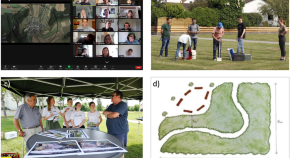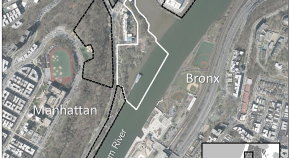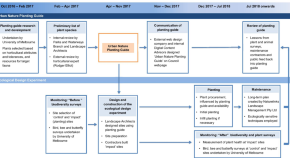
Collection
Ecology with Cities
- Submission status
- Open
- Open for submission from
- 31 May 2021
- Submission deadline
- Ongoing
This topical collection provides an outlet for short articles describing ways of engaging and collaborating with diverse stakeholders to improve the understanding, management, and sustainability of urban social-ecological systems, as encompased by the phrase "ecology with cities". Articles present perspectives, general approaches, case studies, and recommendations relevant to the ecological aspects of urban systems including, but not limited to, citizen/community science; communication strategies; approaches for successful collaboration; personal narratives and reflections about success, failure and lessons learned; and teaching activities for diverse educational contexts. Overall, the aim of this collection is to share novel, insightful and inspiring information about how to more effectively work and communicate with, and educate people in ways that advance urban ecological science and its application. For more background and relevant topics, see the introductory article by Byrne. For pre-submission consultation about possible topics, contact the collection editor, Dr. Loren Byrne.
In addition to following the journal’s main Submission Guidelines, Ecology with Cities contributions should adhere to the following: Appropriate topics include those in the aims and scope of the journal, with explicit connections to ecological aspects of urban systems. Manuscripts should not exceed 3000 words with a maximum of 3 figures and tables. Introduction and conclusion sections should be included with appropriate subheadings for other sections to logically organize the information. Writing style may be narrative and personal, especially for reflections about case studies and lessons learned, but text should present novel, insightful perspectives. Data are not required; however, simple qualitative and quantitative data, including summaries of previously published work, may be presented to support conclusions, especially as supplemental material. These manuscripts are not short versions of standard data-based papers so methods and results sections with extensive data sets are not to be included. Articles should have thorough citations to relevant literature, including in disciplines outside ecological and urban sciences. Articles that describe specific, easy-to-use teaching activities are especially welcomed, and must be organized using the following outline with these subheadings (for examples, see those in this collection and in the book Learner-Centered Teaching Activities for Environmental and Sustainability Studies):
1. Title: clearly indicate a teaching focus
2. Abstract: 150-200 words
3. Introduction: relevant background and citations to social-ecological concepts and a clear statement of the purpose of the activity
4. Learning outcomes: a bulleted list of outcomes that complete the sentence “After completing this activity, students should be able to:"
5. Course context: a bulleted list of the context for which the activity was designed and could be used, including types of courses and students
6. Instructor preparation and materials: what teachers need to do before implementing the activity, including helpful background reading and preparation of materials, which can be provided in supplemental files
7. Learning activities: clear step-by-step instructions for the activities, including time needed for each step, what students do, and any notes about what may be optional to include
8. Extensions and additional connections: a bullet list of follow-up activities to extend the lesson and additional topics that can be connected to this lesson
9. Reflections and conclusions: perspectives about effectiveness and value of the lesson, possible adaptations, and other reflective and summary comments
10. References: include relevant background literature that helps instructors prepare, and articles about similar or complimentary teaching activities
Editors
-
Loren Byrne
Dr. Loren Byrne is Professor of Biology & Environmental Science and Member, Sustainability Studies & Urban Studies Programs at Roger Williams University in Bristol, RI, United States of America.
Articles (13 in this collection)
-

-
Lessons learned about steering a large urban wildlife research network from theory to practice
Authors
- Seth Magle
- Content type: ReviewPaper
- Published: 03 August 2023
- Pages: 1685 - 1691
-
Designing “Tiny Forests” as a lesson for transdisciplinary urban ecology learning
Authors
- Monika Egerer
- Michael Suda
- Content type: Letter
- Open Access
- Published: 31 May 2023
- Pages: 1331 - 1339

-
Towards a pedagogy of social-ecological collaborations: engaging students and urban nonprofits for an ecology with cities
Authors (first, second and last of 4)
- Anne Toomey
- Jason Smith
- Monica Palta
- Content type: OriginalPaper
- Published: 21 February 2023
- Pages: 425 - 432

-
Examining the paradox of urban disease ecology by linking the perspectives of Urban One Health and Ecology with Cities
Authors
- Joel Henrique Ellwanger
- Loren B. Byrne
- José Artur Bogo Chies
- Content type: OriginalPaper
- Published: 15 July 2022
- Pages: 1735 - 1744

-
Sustainable landscaping programs in the United States and their potential to encourage conservation and support ecosystem services
Authors (first, second and last of 4)
- Michelle A. Pham
- Sarah B. Scott
- Mary M. Gardiner
- Content type: OriginalPaper
- Published: 11 May 2022
- Pages: 1481 - 1490

-
Insect “Bee&Bees” and pollinator penthouses: teaching students about pollinators and their services in an urban environment
Authors
- Elizabeth N. Hane
- Karl F. Korfmacher
- Content type: OriginalPaper
- Open Access
- Published: 16 February 2022
- Pages: 1057 - 1064

-
Ecology with Cities
Authors
- Loren B. Byrne
- Content type: EditorialNotes
- Published: 21 January 2022
- Pages: 835 - 837
-
Coproduction of place and knowledge for ecology with the city
Authors
- Steward T. A. Pickett
- Mary L. Cadenasso
- Anne M. Rademacher
- Content type: OriginalPaper
- Open Access
- Published: 25 November 2021
- Pages: 765 - 771

-
Citizen science in cities: an overview of projects focused on urban Australia
Authors
- Erin Roger
- Alice Motion
- Content type: OriginalPaper
- Open Access
- Published: 18 November 2021
- Pages: 741 - 752

-
Designing and managing biodiverse streetscapes: key lessons from the City of Melbourne
Authors (first, second and last of 13)
- Hui-Anne Tan
- Lee Harrison
- Nicholas S. G. Williams
- Content type: OriginalPaper
- Published: 17 November 2021
- Pages: 733 - 740

-
Engaging students in redesigning a local urban space to improve ecosystem services
Authors
- Elizabeth N. Hane
- Karl F. Korfmacher
- Content type: OriginalPaper
- Open Access
- Published: 16 November 2021
- Pages: 719 - 724
-
Researchers working with city administrations: Reflecting on transdisciplinary collaboration under conditions of shared goals but different constraints
Authors
- Robert Home
- Nicole Bauer
- Content type: OriginalPaper
- Open Access
- Published: 23 July 2021
- Pages: 223 - 228


